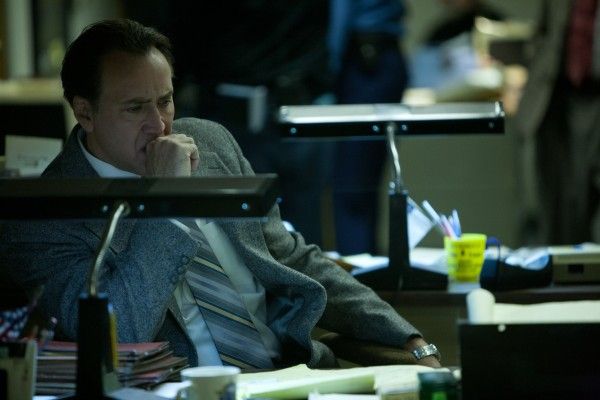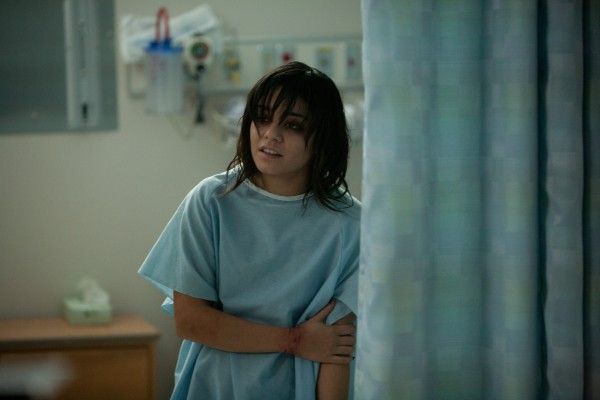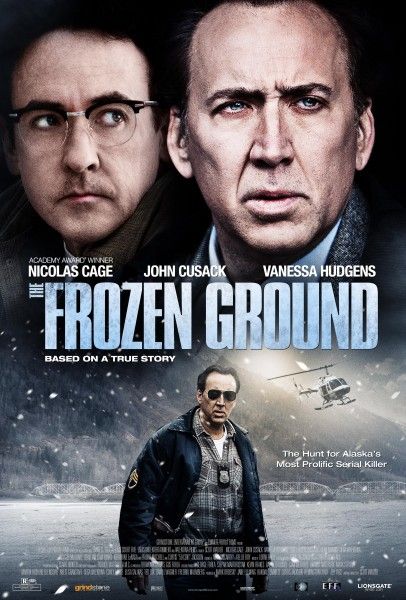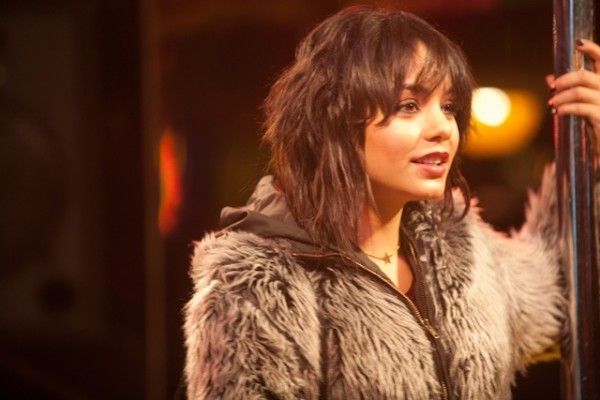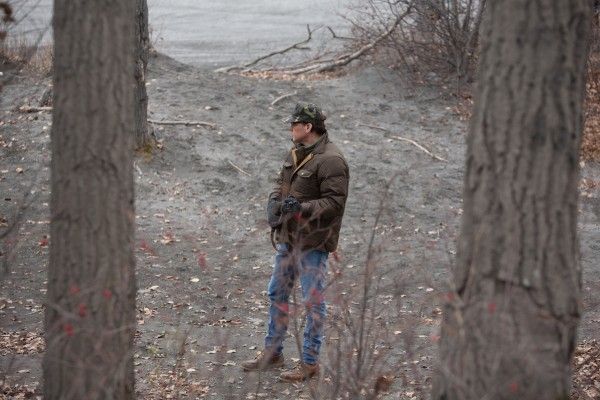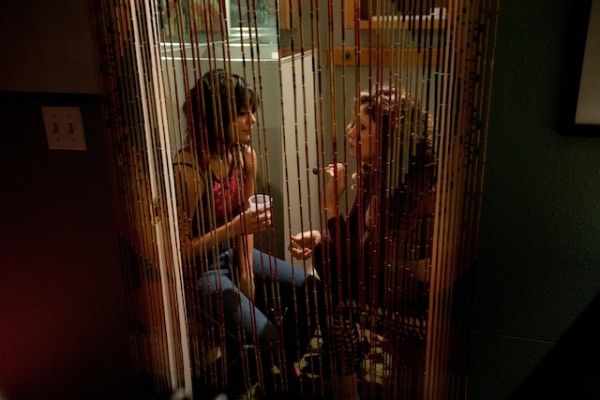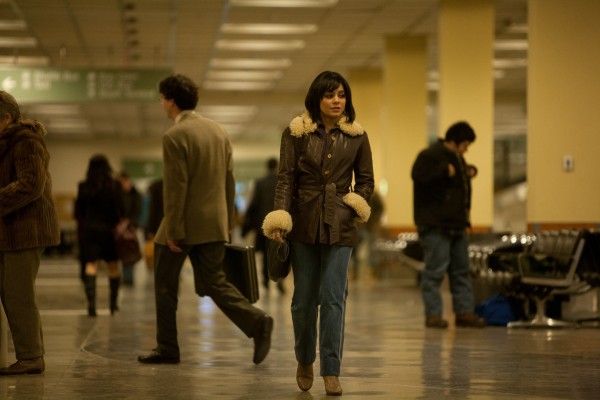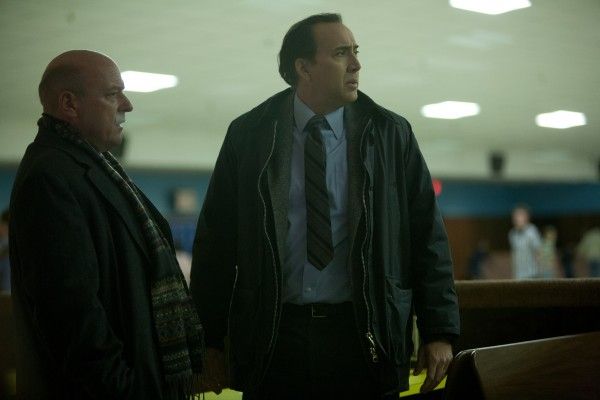Opening in theaters and on demand August 23rd, writer/director Scott Walker’s cat-and-mouse thriller, The Frozen Ground, stars Nicolas Cage as Alaskan State Trooper, Sgt. Jack Halcombe, who’s hot on the trail of a notorious serial predator, Robert Hansen (John Cusack), with the help of Cindy Paulson (Vanessa Hudgens). As Hansen’s only surviving teenage victim who managed to escape, Paulson becomes the vital key in an unlikely partnership that finally brings Hansen to justice. The film based on true events is Walker’s directorial debut and also features Radha Mitchell, Dean Norris and Curtis “50 Cent” Jackson.
At the film’s recent press day, Cage, Hudgens and Walker talked about their research and preparation for the film, condensing a 13-year story into a 2-hour film, what impressed them most about the real Cindy Paulson when they met her, the decision not to interview Robert Hansen, the cold weather and other logistical challenges of shooting a film set in Alaska, dealing with some of the film’s most emotionally difficult scenes, maintaining the integrity of the story within the structure of the film, and striking the right balance between the ugly rawness of the material and the desire to give the victims dignity. Hit the jump to read the rest of the interview.
Question: For Nic, Sgt. Jack Halcombe is an amalgamation of several of the officers, but the primary one was Detective Glenn Flothe. Did you have an opportunity to talk to him at all or anybody else who was involved in the actual investigation?
Nicolas Cage: Yes. I was primarily just drawing my inspiration from Glenn Flothe. I spent about three hours with him on the telephone interviewing him. I did not take the job lightly. I view the man as a hero, a real one. It was important to me to make him look good and I told him that. It was not only to make him look good, but also make the Alaska State Troopers look good. And by good, I mean to treat it responsibly and not do anything…no showing off, no self-aggrandizement, just tell the facts the way they are and demonstrate the good that he did and the actions that he did. I remember I asked him once, “Did the things that Hansen did to these women get into your head at all? Did that get in the way of your job performance? Did it make it harder for you to sleep?” And the first thing he said was, “No. It didn’t get in my head.” The way he said it was so direct that I had no doubt that he was as scary as Hansen was, but on the side of justice, and that he was not going to stop, that we was vigilant, and he was going to get him behind bars.
For Vanessa, what impressed you the most about the real Cindy Paulson the first time you met her?
Vanessa Hudgens: Oh man, so much. I mean, just how brave she was to open up to me and Scott the way that she did. She told us stuff that she’s never told anyone else before. It was a bit of an emotional rollercoaster. I held my breath, too, through a lot of her stories. It was just very, very brave of her. She’s a fighter, and she’s a survivor, and she’s very strong. I look up to her so much so in that sense. It was just this child-like aspect about her that she had as well. She still had wonderment of the world, and it was refreshing and beautiful to see that.
For Scott, it’s rare that we see a film set in Alaska. What was it like making a film up there aside from the fact that it’s cold? In terms of the facilities, did they have the kind of infrastructure that you needed?
Scott Walker: I think probably more now than they did then. We actually had to load three huge trucks in L.A., drive them to Seattle, put them on a barge for four days to arrive in Anchorage, and that was a very limited amount of equipment for what we were going to do. It was just because they didn’t have the amount of equipment [we needed] up there. They’re not geared up for big productions. So that was the initial thing, and then also, I picked the time specifically. I waited five months to actually shoot the film at a very certain time of the year so that we would have no snow ideally, and then snow half way through the shoot, which everyone thought was a ridiculous idea. But, it snowed on the second week. We had two feet of snow. And so, it was then getting cold. We were losing hours of daylight. These two (referring to Vanessa and Nicolas) had to stand around in freezing temperatures. We were all standing around in 700-count down jackets in blizzards and they were in just normal street clothes.
Can you tell us about your cold experience?
Cage: I remember the last day of photography was really cold. We were freezing that day. (to Vanessa) Remember?
Hudgens: Oh my gosh, yeah.
Cage: That was the worst.
Hudgens: It was like negative 10.
Cage: I would look at Scott with such envy because he had these huge parkas on and these snow boots, and I was like, “Wow! I wish I could be you right now.”
Walker: You did like my boots, didn’t you?
Cage: (laughs) Yeah.
Walker: They were these huge boots that were good for minus 70.
Hudgens: Moon boots.
Walker: That’s right.
Cage: We had to dress in this sort of 80s style of clothing that night.
Walker: And then, we had to do the cast scene, the last shots, and we couldn’t have any heating on, and we had the window down so the car wouldn’t fog up. It was like minus…I don’t know what it was, and you were driving.
Hudgens: Yeah, I was. It was intense. It was just so extreme, but it worked. I mean, it put on that extra edge that you could actually use in the scenes, so it worked out. I remember one time we were filming outside and I was walking along. It was my scene with the moose. I only had these leather bound soles on and it was just horrible. After the end of the take, I’d be genuinely concerned that I was getting frostbite because I couldn’t feel my toes. So I gave myself a good foot rub after that.
Cage: Did you ever touch the moose? Did that happen once?
Hudgens: The moose came right at me for the last take, and it veered off at the very last second. It brushed against my arm though.
Cage: I remember that.
Walker: He was big. He was like six and a half, seven feet tall at the shoulder. I mean, that’s a serious animal.
Hudgens: It was intense.
Cage: Only in Alaska will you see something like that in the city.
For Vanessa, can you talk about your preparation for this role? Did you speak to any of the victims’ families? Also, for the pole dancing scenes, did you have to take a class?
Hudgens: (laughs) No. I didn’t take a class, only because it wasn’t supposed to be choreographed or rehearsed. It was a very vulnerable moment for my character, and this was her first go in front of an audience at a pole. So it was meant be clumsy and raw and real. Scott and I didn’t talk about it until that day came along, and he was like, “Yeah, so just go ahead.” (laughs) But it was fun. It worked out great.
Walker: I did say to you, “Don’t be good.”
Hudgens: Yeah. You said, “Don’t be good.” He came up to me after one take. He was like, “Maybe try to stumble around a little bit.” I tripped on one take, and he was like, “Yeah! Do that.” And I’m like, “Oh, okay, so I can just be as sloppy as I can be,” which made it easier and took a lot of the pressure off. I didn’t get to spend any time with any of the other victims’ families. Just hanging out with the woman whom my character is based off of gave me such a strong and solid foundation that I could take all the memories that she told me about and meditate on them and make them my own. I also went out to a couple of strip clubs in Alaska and hung out with the dancers to feel out their environment and see life through their point of view. It was nice. It was a lot of fun.
What kind of insight about the human condition did you walk away with after the experience of making this movie?
Walker: At every stage, when I first went and met Glenn Flothe, and then spent a week with him, I came back from Alaska feeling like it had been a huge week. And then, I spent another week with the real Cindy Paulson and interviewed her for about 50 hours. When you see what people go through in their life, in her case from 11 years old on the Sunset Strip, and that’s safer than being at home, then you realize there are millions of kids today in America called “throwaway youth” where that’s the situation they face. It’s sad. It’s tragic. Even the judge said, “This is the greatest indictment of society” when he sentenced Hansen. You only have to watch the news, and it’s almost like every day there’s someone else found who’s been abused. At the end of the film, I wanted a feeling of it’s not going to be a rosy ending, but you want to have a sense that maybe Cindy has been given another chance. There is some hope that she could gain and learn from this, but it’s heavy. It’s intense.
Cage: It’s something that I think about every day. I mean, I read the paper. I watch the news. You can’t be a parent and not care about these young ladies who are victimized, or kids that are victimized. One of the many things that come out of The Frozen Ground is that there is such a thing as justice. And, with the right people who care enough, it can work. I became a big believer in the severity of justice when I did The Frozen Ground, because I do genuinely worry about children, and there’s a great line in the script where I say, “She’s someone’s kid. She’s somebody’s kid.” And that’s how I feel about it.
How did you feel about portraying both the ugly rawness of it but also showing the characters moving forward and giving the victims dignity?
Walker: That was the most important thing. When I first met with Glenn, and spoke to a lot of the real people, and spoke to Cindy, and told them what I wanted to try and do, that was the most important thing. It was that the story had integrity within the structure of the film. It’s not a documentary, so some things were going to have to be combined, but it’s really from a victim’s perspective. To me, this was a victim’s story and [it was important] to try and portray them in a way that they’re not strippers. They’re not prostitutes. They’re someone’s daughter. They’re someone’s mother. They’re a sister. A lot of these girls weren’t really prostitutes in the way that we all have an image of a prostitute. They literally had arrived to earn some extra money, had a bust-up with the husband, came to Alaska to stay with a sister, got a job in a bar, didn’t expect it to be what it was, and on the third night met this guy. They have a 4-year-old daughter back at home and they’re never seen her again. I met her brother-in-law. Her sister passed away. He took me through the whole [ordeal]. When something like that happens in a family, it’s an enormous hole, full of enormous answers that will never come, and questions, and you’re always wondering. I wanted the film to have that feeling, like you get to the end and it’s just questions as well. But the most important thing was that they have faces, that they are real people, and they’re not just glorified as a cliché stripper who gets killed like we’ve seen in so many films.
For Nic, what was it like working with John Cusack, particularly in that intense interrogation scene, and also with Dean Norris. How was that experience?
Cage: Both actors are formidable talents. I hadn’t seen John in a while. He’s got a remarkable sense of humor, really off the wall. I did two scenes with him in Con Air, but I had no idea what John Cusack I was going to get when we were doing that interrogation scene, and by design. Scott kept us apart for a while by design just so that there would be this electricity in the room. I remember not wanting to rehearse much. It’s a good sign of the camera department allowing me to not rehearse too much, because I wanted to keep it fresh and hopefully have some happy accidents that we could catch on camera right away. I knew working with John, there were going to be some surprises. It was like a game of chess. Hansen was almost like a lawyer in how well he knew the law and what he could and couldn’t get away with. And that comes through with the sort of cat and mouse game that Cusack portrays so well in those scenes. It was like two forces, in a way, on different sides, the ying and yang. It was like Michael and the Devil. Both of them are scary, but they’re on different sides of the law. And that’s what I wanted to get across in those scenes. With Dean, again, it was just effortless. He was very easy to work with, totally natural. What I like about all of Scott’s cast is he brought forth almost a docudrama, photo-realistic, cinema verite style of film performance that was the responsible choice for this kind of subject matter. And going back to something you said earlier, it’s really because of what Vanessa did, bringing that child-like quality to Cindy Paulson, where you realize that this isn’t some icon or some animal that you hunt. This is a person with real feelings that you care about. It’s really down to that.
For Vanessa, what was the most emotionally challenging scene that you had to shoot?
Hudgens: The thing that shook me up the most was the flashback rape scene with John. You only see a little tiny snippet of it in the movie. Scott told us to just go ahead and do whatever we thought was right. John made sure if I ever felt completely uncomfortable to let him know when and we would call it off. Even though it was dark and very taxing emotionally, it was also exciting to be able to put myself in that situation with such an amazing actor and just feed off each other and create something. Scott did not call “Cut” for a few good minutes so we really got to take it somewhere. I remember afterwards, I was like, “Okay. I’ve got to go home and watch cartoons.” I was shaken up. But he was very, very kind, and both Scott and he made me feel so comfortable that I knew I was safe.
Walker: Vanessa, I think that was the most horrible day to do that just because we had photos of exactly how the room was. Clark Hunter (the film’s production designer) and his team had done such an amazing job in the production design following the details of that room. At one stage, we were going to film in the actual basement where it happened, and I’d spoken to the real Cindy and asked her, “Do you think that’s appropriate?” I used her very much as a tonal [sounding board], “What do you think is appropriate or not?” And she said, “I think the world should see the real room that he did this to me in,” and it hadn’t changed in 26 years. In the end, we didn’t choose [to shoot] there for other reasons, but the room was recreated very much like it. So that day was very much like this is when you’ve spoken to the real person as much as Vanessa and I had about exactly beat for beat what she went through, and then you’re actually recreating that. It’s different to when you make something up. Everyone on the set throughout the entire shoot was very aware that this was real, that what we were depicting actually happened a lot of the time, and there was an enormous amount of respect and awareness of that.
Vanessa, was it hard to turn that switch on and off when you had to deal with so many emotionally taxing scenes? How many cigarettes did you smoke?
Hudgens: I smoked a lot of cigarettes, a lot, so much so that I never want to touch another cigarette ever again. The smell of it actually brings back the nauseous feeling that I would feel after finishing a scene and going through an entire pack of cigarettes. My voice did not like me for that one little bit. I was very fortunate to be able to do this with such an amazing cast and director. Like I said, I felt so safe and just guided along the way. It made me feel comforted and also just bringing life to a character that I had so much passion for. She was so very near and dear to my heart. I wanted to bring as much light to her as possible and make people realize that we all need someone to believe in us. It’s amazing that she had someone who actually gave her validity, and like Scott was saying, made it feel like she had another fresh start. I loved my character so much, and even though it was emotional, I knew that it was going to be for something that was bigger than me. I put myself aside, on the back burner, and wanted to focus on her first and foremost.
Walker: I would like to say one thing about it. When we were casting for the Cindy role, there were 60 or 80 young, amazing actresses who wanted the role.
Hudgens: Everyone wanted this part.
Walker: And you came in and you had a cold and I’d given you three scenes that you had to do. They were long scenes, like three or four pages each. You did the Skateland scene which has at least ten or twelve very opposing emotional beats within it by design. And you came in and hit every one – tears on this beat and then anger on that beat, and we all sat there going, “Wow! That’s it.” It was amazing.
Hudgens: (laughing) Yay!
Walker: You did it.
For Scott, you create this wonderful sense of urgency in terms of the procedural and the evidentiary aspects of a criminal investigation. What were your considerations in taking that particular approach in constructing this story?
Walker: Mainly that I didn’t want something that was “3 months later,” “6 months later,” “Two years later,” that lasted 13 years and was like this very long, drawn out thing. I wanted it to have this sense of immediacy and of what it was like. And, when Glenn Flothe came onto the case, I compacted what he did. He came on, and within four weeks, he had the guy caught or was interviewing him. In my mind, I tried to collapse that into about two weeks and then take two big events that happened about a year before and six months after and bring those into the front at the beginning. The intention was to have something that was going to be a police procedural. There’s going to be an enormous amount of detail and information about a lot of cases, so how do you keep that interesting and keep it moving and try never to have it where we’re all sitting around having a conversation about all these details. There has to be walking. There has to be moving. There has to be going somewhere to keep the energy going.
Going back to the rape scene and some of the strip club scenes, what were your thoughts along the way about showing the graphic nature of this world that you were portraying?
Walker: Less is more. We actually shot in one of the most famous clubs that got shut down a month before we arrived there for pre-production. She got it reopened and took it over again and brought it back to life. You walk into these changing rooms, and they’re all covered in graffiti, and the girls had written their names on everything. It was very real. And then, it was just in the editing. We had very little time to shoot any of this film. It was incredibly fast. So, it was a matter of shoot as much as we can, and then in the edit, find the balance. But it was always going to be more about the characters and less about showing a lot of stuff. Once you’ve got the idea, you’ve got the idea. And you have to go back into these clubs and you have to try and make them look different. But yeah, that was the stuff we tried to keep as little as possible.
When you did your research, did you speak with Hansen or any of his family members?
Walker: No. I never did. I spoke to family members. In fact, the photos of the girls at the very end, I was not sure whether to keep that or not. I showed it to a lot of people and they said yes. And then, I just spoke to one of the family members and she was like, “Could you please use this photo? Could you please call her this because this was what we knew her as?” And that helped me. She thought that was a terrific thing as a way to remember her sister. But not with Hansen, no. Hansen, through his lawyer first and then through the Troopers, wanted to talk to me, and I passed. I said no. I didn’t want to give him the opportunity to try and influence. He’s never shown any remorse. In the end, he sent me a message where he basically denied everything and said a lot of things which were very untrue. It showed much more about who he was and still is today. I just thought I’m glad I never went and gave him an audience that he could then have his impact onto the film. His depiction is based on all of the transcripts, all the case files, all the psychiatry analysis, and then all the FBI training manuals on his particular sub-category of serial rapist.
At the beginning of the film, Cindy is rescued from what appears to be her apartment and then later we learn that she escaped from the plane. Was there something cut in between?
Walker: No, there wasn’t. In reality, she escaped from the plane before she was about to be put into it. She ran practically naked through trees, hit a big moose fence at the edge of the airport, and she was across the street from where [the airport was]. It’s actually a motel where she was staying, where her pimp and brother were. There’s a whole bit about how Hansen chased her, and then she got picked up in a pick-up truck and was taken to this motel. And then, the police were about to arrive and the pimps all split. And then, she’s found by the police. Originally, the idea was you would get through to the end of Act 1 and not know who the killer is and that it’s her word against some guy. And then, that changed, and it became in the editing, just to get to that point sooner, that we know much earlier on that it’s Hansen who’s the killer. I wasn’t particularly worried about it, because this is one of those stories that if you’re going to stick to the truth, they knew very early on who it was. It’s not a whodunit and like, “We must find who this person is.” Very early on, it was, “We have the guy.” But, it’s 1983 and there’s a mountain of evidence that you have to find in order to convict. And so, if I changed that, if I tried to keep him the secret until the third act, it wouldn’t have been a true story. I would have had to change so much that I might as well have just made a fictional story.
Can you talk about Lionsgate’s release strategy of putting this out on demand at the same time as it’s out in theaters?
Walker: Well, this is my first film. When we first showed them the first cut, I was just thrilled to get theatrical. It’s an interesting film demographically about where it sits. I think it’s got a much stronger female appeal personally, and so I deferred to them. They’re the experts on how the film will best reach the best audience.
Nic, you mentioned as a parent there are things that you think about. With this movie, there are lots of themes. What would you want families to think about? What’s important to you?
Cage: I think it just reinforces the idea of the home as the hearth and that world peace begins at home. If you can stay with your kids and give them the love and the support that they need so they feel safe at home, then hopefully they’re not compelled to run away and these atrocities may not occur. I guess it’s as simple as that.


